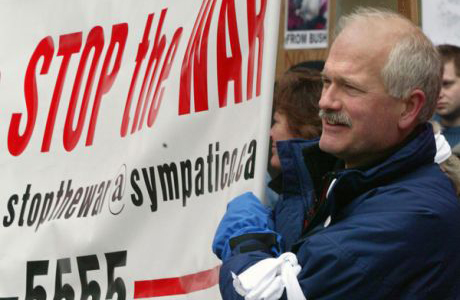Features
You are here
NDP: from opposition to equivocation

October 5, 2012
When Jack Layton ran for NDP leader in 2003, a central plank in his campaign was opposition to the looming war in Iraq. During every media interview, Layton spoke out against the war, and promoted the historic February 15 protests that helped keep Canada out of Iraq. Today, NDP leader Thomas Mulcair recently backed Harper’s decision to cut ties with Iran, a move that could quickly lead to war.
Mulcair is a well-known supporter of Israel, but after becoming NDP leader, he seemed to temper his position, saying his priority was to “work hard for peace” and that Iran is “a very shaky regime, but the best way to make people coalesce and support a regime is to attack it.”
Despite these words, Mulcair supports sanctions, which are almost always the first step to war, as the Iraq War shows. Now he is equivocating on the second step: ending diplomatic relations. After foreign affairs critic Paul Dewar called Harper’s move “bad diplomacy,” Mulcair backtracked, stating: “It’s also becoming increasingly clear that there were serious concerns, we don’t have the same information but it would appear that there might be some very solid information that would have led the government to that decision, so until we have that information it’s hard to comment further.”
This shift in the NDP’s position is not just the result of a different leader: it reflects the party’s rightward drift that continues to separate it from the movements that gave it strength.
In 2002, the NDP’s original position on Iraq was to oppose war—unless the UN supported it. But the growing anti-war mobilization of late 2002 and early 2003 pushed the party to adopt the movement’s central demand: “With or without the UN, don’t attack Iraq!” With only a handful of seats in Parliament at the time, the NDP nevertheless provided a megaphone for the mass demonstrations underway from coast to coast. The effect was to split the Liberals down the middle and to force the Chrétien government to stay out of the war. In the next election, a million more people voted for the NDP. The same kind of pressure from the anti-war movement won the NDP to its “troops out now” position on Afghanistan in 2006.
Despite the support the NDP has attracted from movements in the street, on the campus, or in the workplace, the party has vacillated between supporting them and subordinating them to its parliamentary politics. During negotiations to form a coalition government with the Liberals in 2008, the NDP was wiling to abandon its opposition to the war in Afghanistan and corporate tax cuts. Ironically, the “orange wave” that catapulted the NDP into the Official Opposition, and that was based on the perception that an NDP government would bring the troops home and tax the rich, has only increased this vacillation.
For example, while the NDP led an impressive filibuster in Parliament to back locked-out postal workers, it then unanimously supported the NATO-led war on Libya. As the 2015 election approaches, the logic of electoralism will increasingly prevail over the needs of the movements. This helps explain’s Mulcair’s equivocation on Iran, essentially backing the government’s latest move.
Sadly, although the NDP is much larger than it was in 2003, it is playing a significantly smaller role on the anti-war front. But this can change. October 6 will be a day of action against war on Iran, which can be a launching pad for re-building the anti-war movement and winning the NDP to a principled anti-war position. Harper has a long history of backing Israeli wars—from Lebanon in 2006 to Gaza in 2009—and has not ruled out support for an Israeli-led strike against Iran. We need an Opposition that will oppose any attempt to escalate the conflict with Iran. For that to happen, we need to build a strong movement outside Parliament.
Section:
- Log in to post comments









